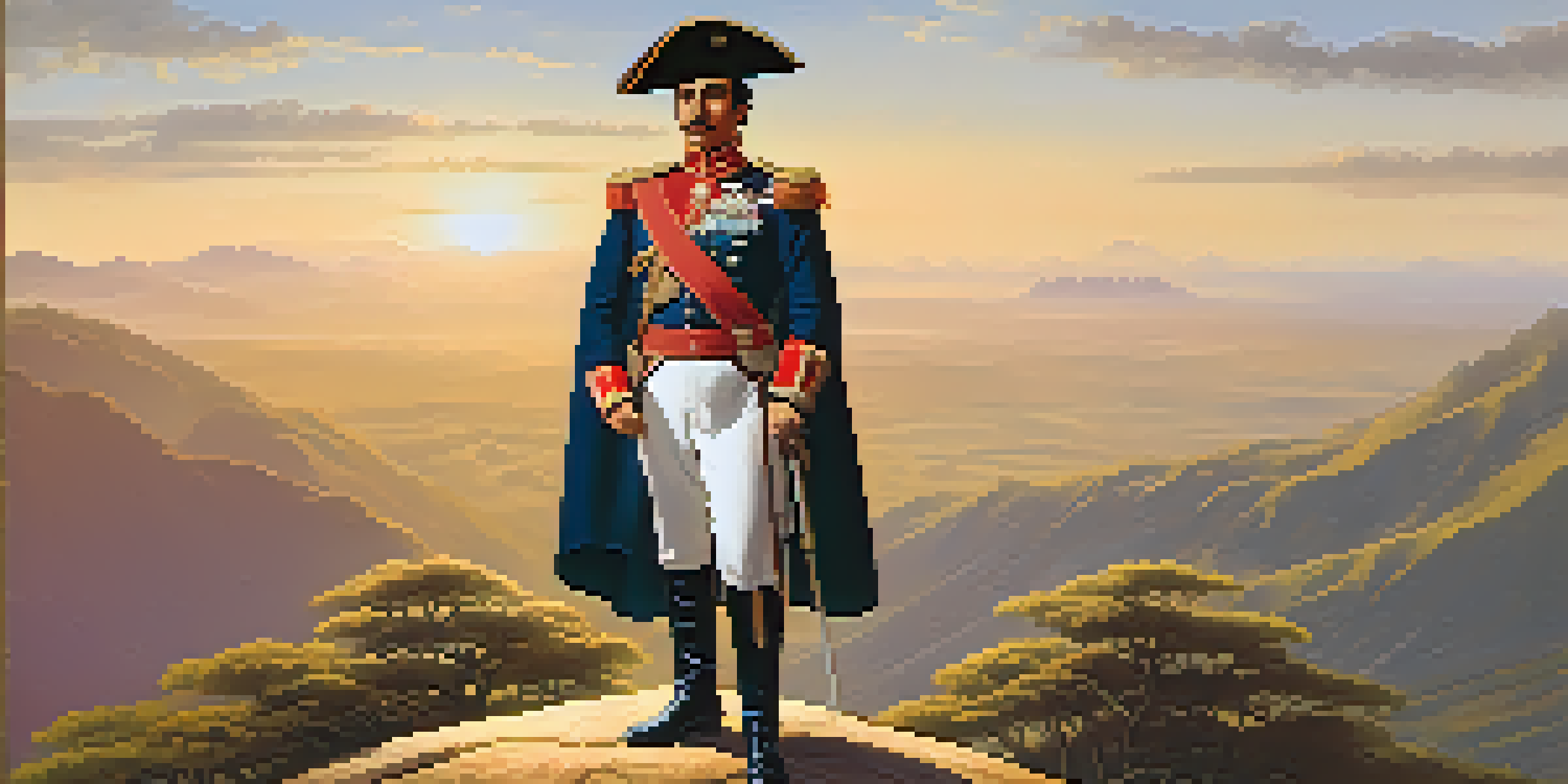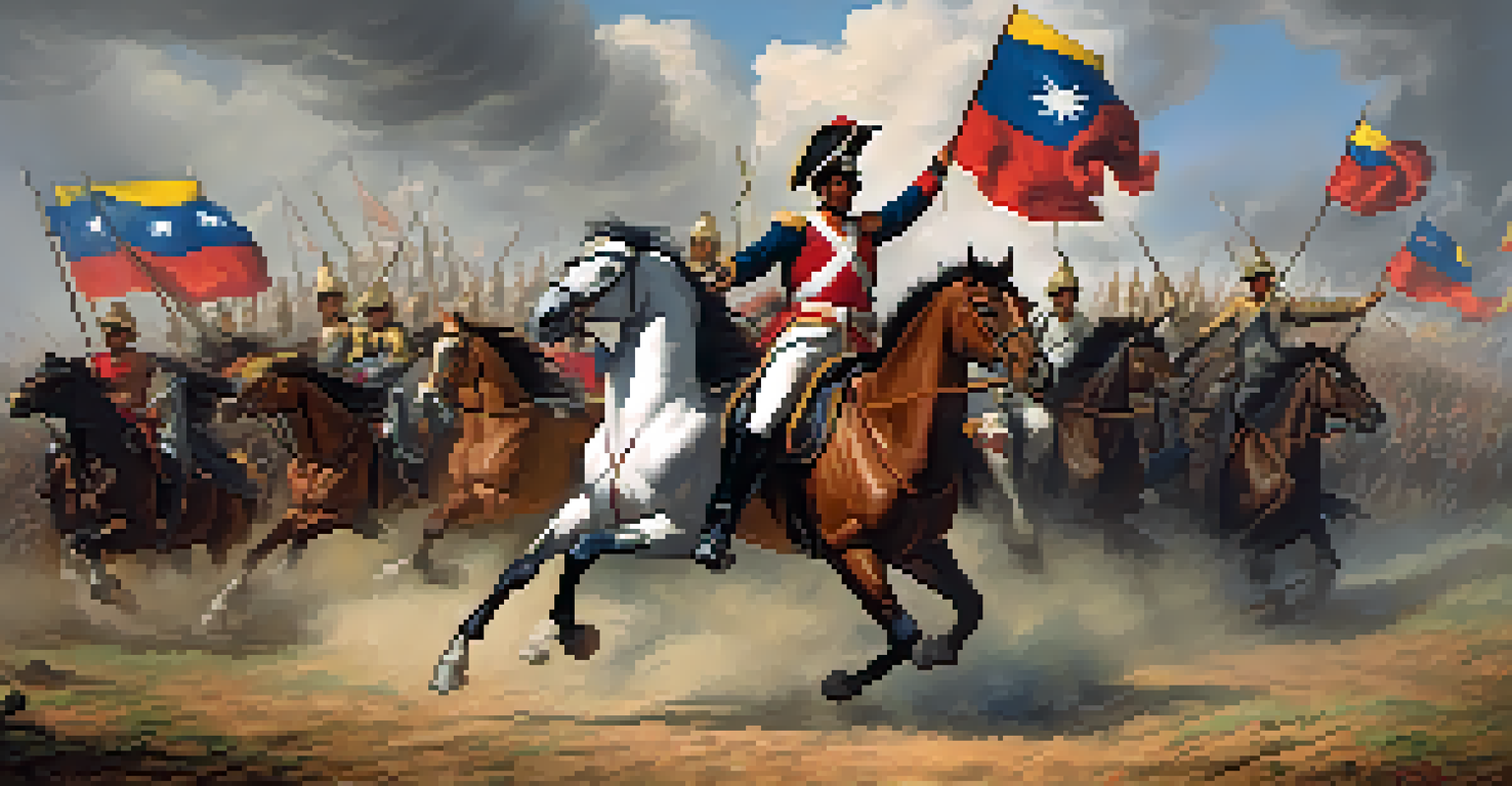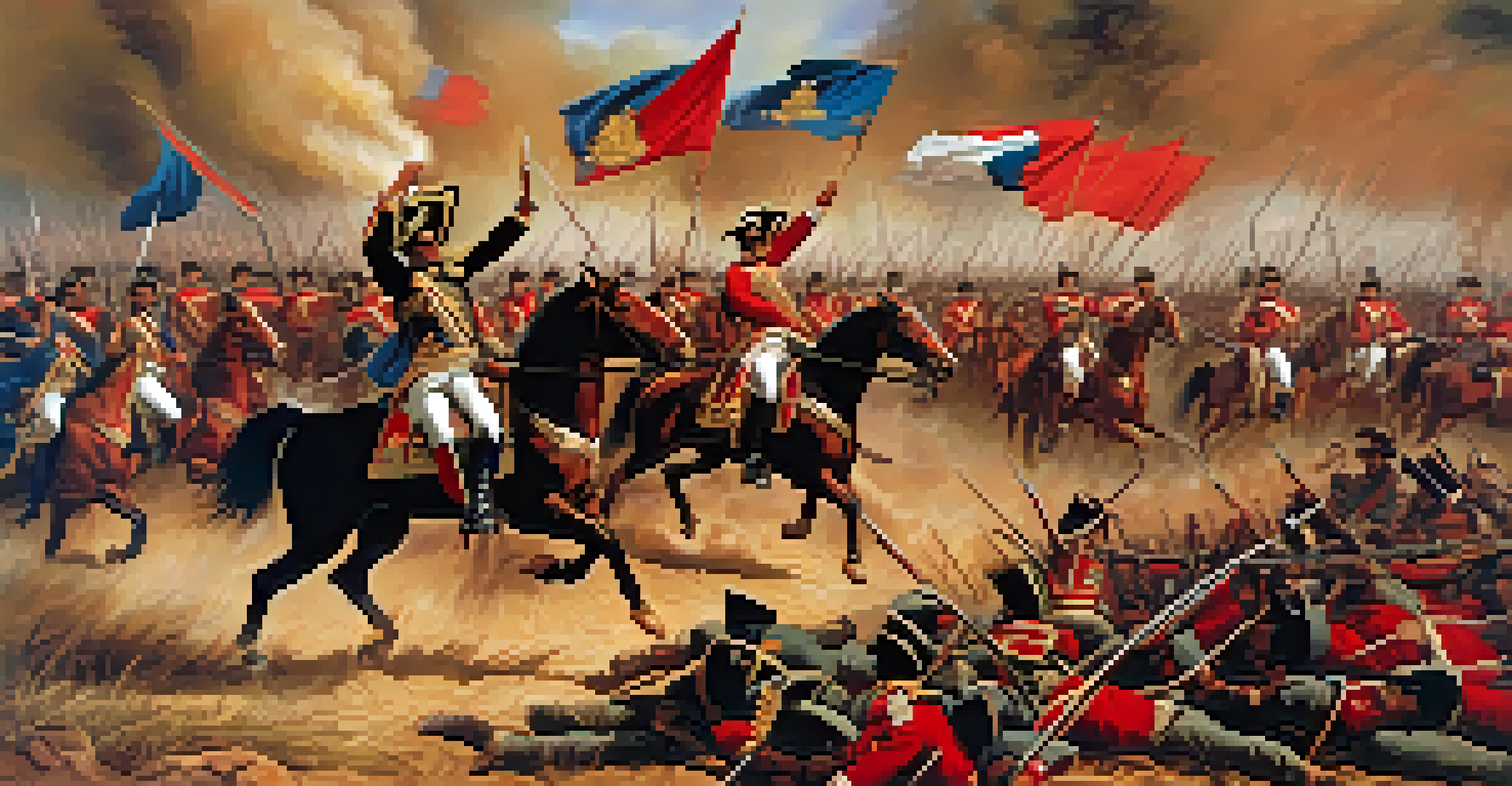Simón Bolívar: The Liberator of Peru and South America

The Early Life of Simón Bolívar: A Future Revolutionary
Simón Bolívar was born on July 24, 1783, in Caracas, Venezuela, into a wealthy family. His early life was marked by privilege, but the loss of his parents left a profound impact on him. This loss fueled his desire for freedom and justice, shaping his future as a revolutionary leader. Bolívar's education in Europe exposed him to Enlightenment ideas, igniting his passion for independence.
The man who has gotten everything he wants is all in favor of peace and order.
During his time in Europe, Bolívar encountered various political philosophies that influenced his thinking. He was particularly inspired by the American and French revolutions, which demonstrated the power of the people's will. These experiences planted the seeds for Bolívar's own revolutionary ambitions back in South America. As he returned home, he was determined to fight for the freedom of his people.
Bolívar's early life laid the groundwork for his role as a leader in the fight against Spanish colonial rule. His understanding of social injustice and desire for change would soon transform him into 'El Libertador.' This transformation marked the beginning of a journey that would change the face of South America forever.
The Spark of Revolution: Bolívar Joins the Fight
The early 19th century was a tumultuous time in South America, with growing discontent against Spanish rule. Bolívar became actively involved in revolutionary activities, joining forces with other leaders who shared his vision of independence. In 1810, he played a pivotal role in the establishment of a junta in Caracas, signaling the start of the Venezuelan War of Independence. This was a turning point that would set the stage for a larger movement across the continent.

Bolívar's leadership was characterized by both military strategy and diplomatic prowess. He rallied troops and garnered support from various factions, including the Creole population who sought more autonomy. His ability to inspire loyalty and courage among his followers became a hallmark of his leadership style. Bolívar's unwavering commitment to the cause of independence made him a beacon of hope for many.
Bolívar: A Revolutionary Leader
Simón Bolívar's early life and European education ignited his passion for independence, leading him to become a key figure in the fight against Spanish colonial rule.
However, the road to liberation was fraught with challenges. Bolívar faced setbacks and betrayals, including the loss of key battles. Yet, his resilience and determination shone through as he continued to fight for the freedom of South America. This relentless spirit endeared him to the people, solidifying his place as a revolutionary hero.
Bolívar's Military Campaigns: Strategies for Success
Bolívar's military strategies were innovative and often unorthodox, allowing him to outmaneuver larger Spanish forces. One of his notable tactics was the use of surprise attacks, which caught his enemies off guard. He also emphasized the importance of mobility in warfare, enabling his troops to strike quickly and retreat when necessary. These strategies proved crucial in several key battles, such as the Battle of Boyacá in 1819.
Freedom is the oxygen of the soul.
The victory at Boyacá was a significant milestone in Bolívar's campaign for independence. It not only secured Colombian territory but also bolstered Bolívar's reputation as a formidable military leader. Following this victory, Bolívar continued to expand his campaign, liberating Ecuador and Peru in the process. His ability to unite diverse groups under a common cause was pivotal in achieving these victories.
Bolívar's military campaigns were not just about battles; they were about forging a sense of national identity among the people. He understood that the struggle for independence was also a struggle for self-determination. His leadership inspired a generation of revolutionaries who would carry the torch of freedom long after his campaigns ended.
The Role of Bolívar in Peru's Liberation
Bolívar's influence extended beyond Venezuela; he played a crucial role in Peru's struggle for independence. In 1824, he led a decisive campaign to liberate Peru from Spanish control. His arrival in the country was met with enthusiasm from revolutionaries and citizens alike, who saw him as a symbol of hope. Bolívar's vision for a united South America resonated deeply with the Peruvian people.
The Battle of Ayacucho in 1824 marked a turning point in the fight for Peruvian independence. Bolívar's forces, alongside local revolutionaries, achieved a stunning victory against the Spanish. This battle not only secured Peru's freedom but also cemented Bolívar's legacy as a key figure in South American history. The triumph was celebrated throughout the continent, marking the decline of Spanish colonial power.
Military Strategies for Independence
Bolívar's innovative military tactics, such as surprise attacks and mobility, were crucial in securing victories during the liberation of several South American countries.
After Peru's liberation, Bolívar worked tirelessly to establish a stable government and promote unity among the newly independent nations. He envisioned a confederation of South American countries, believing that collaboration was essential for lasting peace. Bolívar's efforts in Peru were pivotal in shaping the future of the nation and solidifying his status as 'El Libertador.'
Challenges and Setbacks: The Struggles of a Leader
Despite his successes, Bolívar faced numerous challenges in his quest for a unified South America. Political infighting and regional rivalries often undermined his vision for collaboration. Many leaders were hesitant to relinquish power, leading to conflicts that hindered Bolívar's efforts. These struggles tested Bolívar's resolve, forcing him to navigate a complex political landscape.
Bolívar's idealism sometimes clashed with the harsh realities of governance. He struggled to implement his vision of a democratic society, facing opposition from those who preferred autocratic rule. His attempts to establish a centralized government often met with resistance, leading to disillusionment. Bolívar's journey was not just about military victories; it was also about reconciling ideals with the practicalities of leadership.
As a result of these challenges, Bolívar's health and spirit began to wane. After years of relentless campaigning, he grew weary of the constant battles for control and unity. Understanding the importance of legacy, Bolívar reflected on his achievements and the future of South America. His struggles highlighted the complexities of revolution and the difficulties of building a new nation.
The Legacy of Simón Bolívar: A Lasting Impact
Simón Bolívar's legacy is deeply woven into the fabric of South American history. His efforts in liberating several countries from Spanish rule earned him the title of 'El Libertador.' Beyond military accomplishments, Bolívar inspired generations of leaders and activists who continue to fight for freedom and justice. His vision of a united South America still resonates in contemporary discussions about regional cooperation.
Bolívar's ideals of liberty, equality, and fraternity remain relevant today, serving as guiding principles for various social movements. His writings and speeches reflect a commitment to human rights and democracy, influencing countless individuals and political movements. Statues and monuments honoring Bolívar can be found throughout Latin America, symbolizing his enduring impact on the continent.
Legacy of Unity and Justice
Bolívar's enduring legacy inspires ongoing movements for freedom and regional cooperation across Latin America, emphasizing the importance of unity in the quest for justice.
In recognizing Bolívar's legacy, we also acknowledge the complexities of his life and the challenges of the revolutions he led. While he achieved remarkable victories, the struggles for unity and governance remind us that the path to freedom is often fraught with difficulties. Bolívar's story is a testament to the enduring quest for justice and the power of a single individual's vision to change the world.
Bolívar Today: A Symbol of Hope and Unity
Today, Simón Bolívar remains a symbol of hope for many in Latin America and beyond. His life story inspires those who strive for justice, equality, and freedom from oppression. As political and social movements continue to evolve, Bolívar's vision for unity serves as a powerful reminder of the importance of collaboration among nations. He is often invoked in discussions about regional integration and solidarity.
In Venezuela, Bolívar's legacy is particularly poignant, as the nation grapples with political and economic challenges. His image is used to rally support for various causes, reminding citizens of their shared history and aspirations. The ideals he championed continue to resonate, galvanizing people in their pursuit of a brighter future. Bolívar's influence transcends borders, reminding us of the universal quest for liberty.

As we reflect on Bolívar's life and contributions, we recognize that his journey is not just a historical narrative; it is a call to action. His dreams of a united and free South America encourage us to continue advocating for the values he held dear. Bolívar's legacy is alive, inspiring new generations to fight for justice and unity in an ever-changing world.